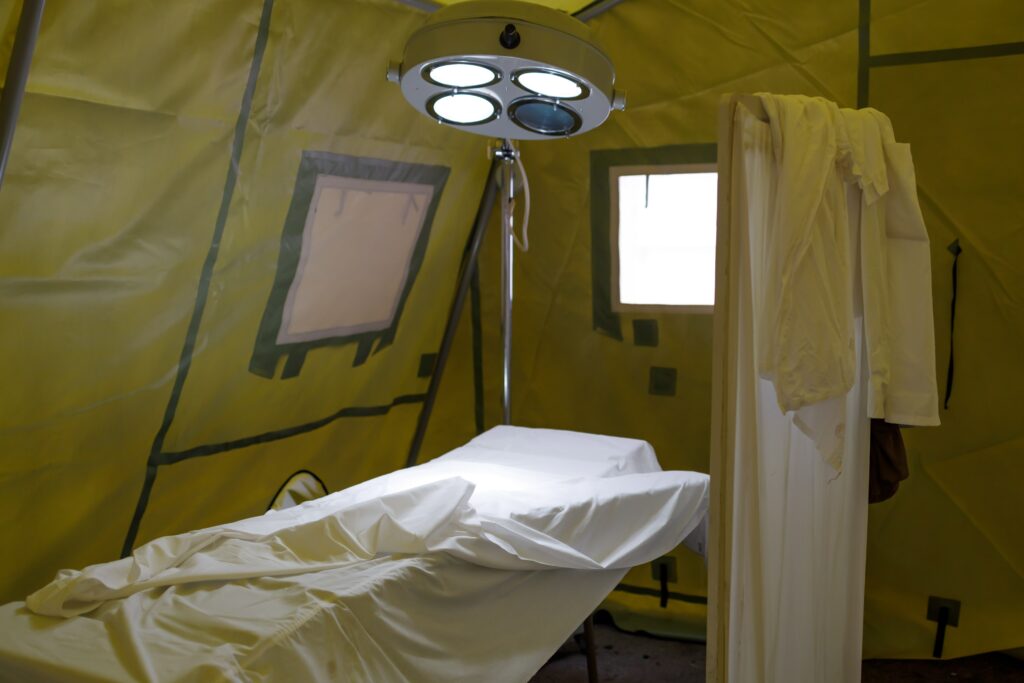by Anas Ismail

Conflict is known to affect health in a myriad of ways[1] including, but not limited to, attacks on health workers and facilities, disruption of access to health services, deterioration of water and sanitation infrastructure, and interruption of training and education for medical students and junior doctors. The more severe and long-lasting the conflict, the more significant its effects on health and the harder it will be to recover and improve health in post-conflict situations. Moreover, the impacts of conflict extend beyond the national borders in which they occur, and bleed over into neighbouring states whose governance, in the face of conflicts’ destabilizing effects and mass refugee flows, is significantly challenged.
The Eastern Mediterranean is home to one of the oldest conflicts, that between Israel and Palestine, and one of the most devastating, the Syrian civil war.
In Palestine, over five decades of occupation have taken their toll on all aspects of healthcare from medical education to patient care and life conditions, all aspects further explored in this series. In Syria, the conflict has been characterized by the weaponization of healthcare, i.e. attacking or withholding healthcare as a strategy of war. Moreover, while the parties to these conflicts suffer extensively, other countries in the region are also struggling from their spill-over effects alongside their own internal divisions and unrest. Lebanon continues to endure an unprecedented economic crisis, deep internal divisions, and lack of proper governance on the political level – all whilst hosting nearly 1.5 million Syrian refugees. These have had a significant impact on the country’s youth whose mental health needs seems to be far from being met in a country where psychiatric and psychological services are largely neglected, with a treatment gap close to 90%. Jordan, on the other hand, enjoys relatively stable governance and economic conditions, but it has been strained by surrounding instability. As a result of the protracted Israeli-Palestinian conflict, it hosts 2.2 million Palestinian refugees, the most of any country, and over the past decade these have been joined by 1 million Syrian refugees, meaning that over 30% of Jordan’s total resident population are displaced peoples.
This series aims to capture various experiences of healthcare delivery and medical education in the region. The first article brings to light how medical education is being provided completely online for the first time in Gaza under settings of protracted conflict, chronic electricity shortage, and economic impoverishment. The second piece discusses the underlying causes of the looming epidemic of mental health disorders among the youth in Lebanon and how the economic crisis is impacting it. The third article illuminates the intricacies and security implications of patients in Gaza needing, and seeking, treatment abroad. In the fourth piece, the author, a Syrian doctor in diaspora, discusses how attacking the healthcare work force in Syria is affecting the provision of health and what needs to be done. The final piece describes the far-reaching impact of war-related amputations on civilians in the Gaza Strip and argues how modern warfare, such as drone attacks, are causing an increase in such injuries.
Series Publication Schedule
- 26 April 2021 - Part I: Medical education under blockade, protracted conflict and constant warfare. By Alaa Ismail
- 27 April 2021 - Part II: Lebanon in Ashes: A Looming Mental Health Crisis? By Loubaba Al Wazir
- 28 April 2021 - Part III: Medical Referrals in Gaza: Uncertainty and Agony for Palestinians Patients. By Anas Ismail
- 29 April 2021 - Part IV: How does the Syrian Civil War affect health care workers? By Abdullah Al Houri
- 30 April 2021 - Part V: Life after traumatic amputations in the Gaza Strip. By Hanne Heszlein-Lossius
[1] Howard, Natasha, Hossain, Mazeda, Ho, Lara. “Effects of Conflict on Heath.” In Conflict and Health, 25–32. Berkshire: McGraw-Hill Education, 2012.
Anas Ismail is a medical doctor originally from Gaza, Palestine, where he received his education and training. As a citizen of Gaza, and later as a medical student, he personally lived the impact that conflict has on life in general and on healthcare in specific. This led him to an interest in global health as a means of learning more about the relationship between conflict and health.
With a joint scholarship from the Chevening Awards and the Said Foundation, Anas is currently studying MSc Global health with conflict and security at King’s College, London. He is the Production Manager for Strife Blog and a Series Editor at Strife.
Dr Anas Ismail is studying an MSc in global health with conflict and security at KCL. He graduated as a medical doctor from Gaza. He is interested in studying impact of conflict on health, especially health services and delivery. He is the Production Manager at Strife blog and a Series Editor.